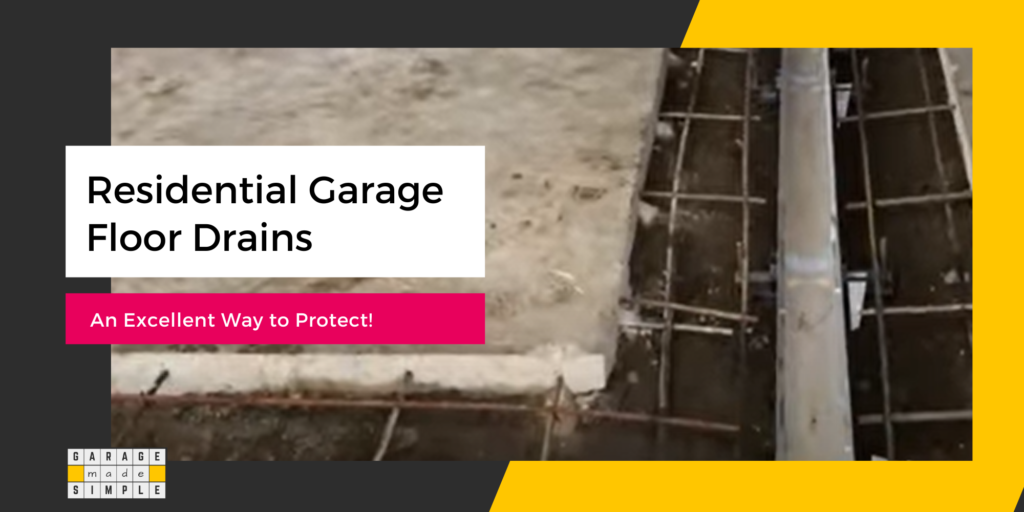Residential Garage Floor Drains: An Excellent Way To Protect!
As an Amazon Associate, I earn from qualifying purchases.
Does a Residential Garage Need a Drain?
Are you planning to build a new garage? Or does your existing garage have water pooling on the floor, quite often? In either case, you certainly want to know if residential garage floor drains are required or not?
Residential garage floor drains are not specifically required by the International Residential Code (IRC). The code, however, does require the residential garage floor to slope towards the garage door or a drain.
Construction and significant modifications to a garage can only be done by obtaining a permit from the local building authority. The rules adopted by a local building authority can vary from location to location.
Some jurisdictions insist on residential garage floor drains whereas others do not permit such a construction. Both have valid reasons. You need to check the relevant building code from your local authority and comply.
Unless your local building authority specifically prohibits residential garage floor drains, it is helpful to incorporate them in the floor plan at the construction stage itself. This will save you time & money later.
To find out more check out my earlier post, Garage Floor Drains Code: 5 Useful Things Really Worth Knowing!

You can also add floor drains to an existing garage without them. Residential garage floor drains are useful, as garage floors get wet all the time due to for a variety of reasons such as
- Water flowing in from the driveway after heavy rains
- Rain water drips and snow melts from parked cars
- Plumbing and roof leaks
- Groundwater seepage through foundation walls
Having residential garage floor drains also makes it possible to use a pressure washer to wash cars inside and clean the garage floor, when required.
Do You Need a Permit for Adding a Residential Garage Floor Drain?
In most jurisdictions of the United States, any significant work, such as adding residential garage floor drains will require a permit from the local building authorities.
When it comes to residential garage floor drains, enforcement agencies are especially concerned about
- What will flow into the drain? Gas spills & oil leaks are to be expected in a garage. There may be other harmful chemicals too!
- Will the drains have a trap? High quantity of oil, grease and other chemicals should not be disposed off in a drain.
- Where will the drains discharge to?
Obtaining the permit for adding residential garage floor drains will certainly depend on these considerations.
Where Can a Residential Floor Garage Drain Discharge?
The US Environmental Protection Agency (EPA) requires that only uncontaminated rain water from the roof, landscape or driveway be allowed to be discharged to the storm sewer system.
Dumping of motor vehicle fluids, household hazardous waste, paint, grass clipping, leaf litter or animal waste into drains that discharge into the storm sewer system is described as illicit activity.
At a macro level, stormwater drains are discharged into local water bodies such as lakes or rivers, without any treatment.
Waste water, with organic contaminants, from bathroom, toilet, kitchen, etc. are to be discharged only to the sanitary sewer system. residential garage floor drains may also discharge to the sanitary sewer system.
However, authorities are likely to stipulate maximum levels of chemical contamination permissible. Oil & grease levels can be quite high in washings of the garage floor. As such, authorities may require that even residential garage floor drains be equipped with oil traps.
Drain to Daylight
Subject to approval from authorities, a garage drain can also discharge to daylight. Discharging to daylight means that the garage floor drain outlet can simply let the water just flow out into the backyard landscape. The water will permeate into the soil and become part of the natural groundwater.
Prior approval is absolutely necessary. The enforcing authority may determine that the discharge does not meet environmental regulations regarding contamination levels. After all, the discharged water will ultimately end up in a natural water body.
Is It Hard to Add a Drain to a Residential Garage?
Ideally residential garage door drains should be installed at the time of placing the concrete floor slab. If it has not been done for any reason it is still possible to add a drain to the garage floor at a later date.
It is generally not very difficult to add a drain to a residential garage. You can get a professional to do it. But you could even do it yourself if you have some experience and DIY skills.
You will need to rent a concrete trench cutter. Once the trench has been prepared the remaining job is made easy as modular floor drains are available. Use a quick setting concrete mix for securing the drain to the floor and smoothing out the floor.
The steps to follow are:
- Determine the best location and layout for the garage floor drains.
- Cut out a section of the concrete floor to create a trench for the drain.
- Install the drain body and attach it to the plumbing line.
- Install a drain trap at a convenient location, if required by the local building code.
- Make sure that the pitch of the drain is between 2 – 4%.
- Pour a new layer of concrete to cover the drain and smooth it out.
You must adhere to local building codes and obtain the permit before starting this project.
How Much Does It Cost to Install a Drain in a Garage?
You can expect to pay anywhere from $500 to $2,500 to install a drain in a garage.
The actual cost will depend on the size and layout of the garage, the location of the nearest plumbing line, and the type of drain being installed.
For example, installing a simple floor drain in an existing garage, with easy access to a plumbing line, may cost around $500 to $1,000. A more complex drain system with multiple outlets and a sump pump could set you back by $2,500 or more.
Always get quotes from multiple contractors to get a fair price. Be sure to ask about any additional costs or fees that may be involved, such as permit fees or the cost of disposing of any debris or waste materials.
If you think all the quotes are way too high, consider doing the project yourself.
Thank you very much for reading the post. I do hope you found it informative and useful.






